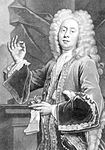
An Evening's Love, or The Mock Astrologer is a comedy in prose by John Dryden. It was first performed before Charles II and Queen Catherine by the King's Company at the Theatre Royal on Bridges Street, London, on Friday, 12 June 1668. Samuel Pepys saw the play on 20 June of that year, but didn't like it; in his Diary he called it "very smutty."

Amboyna, or the Cruelties of the Dutch to the English Merchants is a tragedy by John Dryden written in 1673. Its subject is the Amboyna massacre and the death of Gabriel Towerson that took place on Ambon Island in 1623. Dryden reportedly wrote the play in the short space of a month; he wanted to produce a topical piece, since England was at that time at war with the Dutch Republic. It was dedicated to Lord Clifford, a member of the Cabal.

Sophonisba, or Hannibal's Overthrow is a 1675 tragedy by the English writer Nathaniel Lee. It is based on the story of the Carthaginian noblewoman Sophonisba, one of numerous versions based on the story including John Marston's The Wonder of Women (1606) and James Thomson's Sophonisba (1730).

Greenwich Park is a 1691 comedy play by the English writer William Mountfort.
The Richmond Heiress is a 1693 comedy play by the English writer Thomas D'Urfey.

The Cobbler of Preston is a 1716 comedy play by Christopher Bullock, although a separate play of the same title was written by Charles Johnson the same year. A one-act afterpiece is the origin of the phrase "Tis impossible to be sure of anything but Death and Taxes". In the preface to the published version Bullock suggested that he had begun writing the play just four days before its premiere. It takes inspiration from The Taming of the Shrew by William Shakespeare and is set in Preston, Lancashire. The town had recently been scene of fighting during the 1715 Jacobite Rebellion at the Battle of Preston. Bullock's play does not overtly reference the rebellion, but has undertones supportive of the Hanoverian Dynasty.
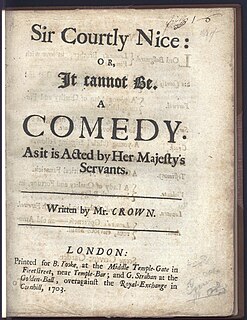
Sir Courtly Nice: Or, It Cannot Be is a 1685 comedy play by the English writer John Crowne. Rehearsals by the United Company were underway when the death of Charles II in February led to the closure of all theatres as a mark of respect. The play was eventually staged on 9 May at the Theatre Royal, Drury Lane. It is the tradition of the Restoration Comedy. A popular hit it became a stock part of the repertoire for more than a century, with Colley Cibber and Anne Oldfield appearing in a celebrated 1709 revival.
Squire Oldsapp is a 1678 comedy play by the English writer Thomas D'Urfey. Staged by the Duke's Company at the Dorset Garden Theatre in London, the original cast included Thomas Betterton as Welfore, William Smith as Henry, John Crosby as Lovell, James Nokes as Squire Oldsapp, Anthony Leigh as Sir Frederick Banter, Samuel Sandford as Colonel Buff, Cave Underhill as Pimpo, Emily Price as Christina and Elizabeth Currer as Madame Tricklove.
The London Cuckolds is a 1681 comedy play by the English writer Edward Ravenscroft.

Dame Dobson is a 1683 comedy play by the English writer Edward Ravenscroft.

A Fond Husband; Or, The Plotting Sisters also known as The Fond Husband is a 1677 comedy play by the English writer Thomas D'Urfey. It was first staged by the Duke's Company at London's Dorset Garden Theatre with a cast that included William Smith as Rashley, Henry Harris as Ranger, James Nokes as Peregrine Bubble, Anthony Leigh as Old Fumble, Samuel Sandford as Sir Roger Petulant, Thomas Jevon as Sneak, John Richards as Spatterdash, Thomas Percival as Apothecary, Elizabeth Barry as Emillia, Rebecca Marshall as Maria and Margaret Hughes as Cordelia. The published version was dedicated to the Irish statesman James Butler, Duke of Ormonde.
The Massacre of Paris is a 1689 tragedy by the English writer Nathaniel Lee. It was first staged by the United Company at the Theatre Royal, Drury Lane. It is based around the 1572 St. Bartholomew's Day massacre which led the killing of many Huguenots during the French Wars of Religion. The events had previously been portrayed in Christopher Marlowe's Elizabethan play The Massacre at Paris.
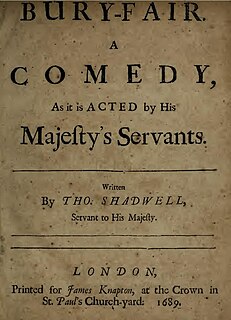
Bury Fair is a 1689 comedy play by the English writer Thomas Shadwell. It is part of the tradition of Restoration Comedy that flourished during the era. It was first staged by the United Company at the Theatre Royal, Drury Lane in London.

Theodosius; Or, The Force Of Love is a 1680 tragedy by the English writer Nathaniel Lee. It was first staged by the Duke's Company at the Dorset Garden Theatre. It takes place during the reign of the Roman Emperor Theodosius II. Incidental music for the play was composed by Henry Purcell.

Love In The Dark; Or, The Man of Bus'ness is a 1675 comedy play by the English writer Francis Fane. It was first staged by the King's Company at the Theatre Royal, Drury Lane in London. The epilogue was written by the Earl of Rochester, and may also have contributed some of the more libertine lines to the play. It is set in Venice.
Gloriana; Or, The Court of Augustus Caesar is 1676 tragedy by the English writer Nathaniel Lee. It was first performed by the King's Company at the Theatre Royal, Drury Lane in London.
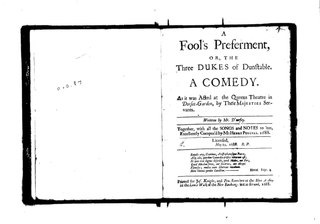
A Fool's Preferment; Or, The Three Dukes Of Dunstable is a 1688 comedy play by the English writer Thomas D'Urfey. It is a reworking of John Fletcher's Jacobean work The Noble Gentleman. It was first performed by the United Company at the Dorset Garden Theatre in London. Henry Purcell composed the play's incidental music. It was his first major work composingfor the theatre in seven years since Sir Barnaby Whigg.
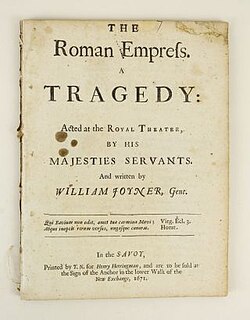
The Roman Empress is a 1670 tragedy by the writer William Joyner. It was first staged by the King's Company at the Theatre Royal, Drury Lane.
The Amorous Old Woman; Or, 'Tis Well If It Take is a 1674 comedy play by the English writer Thomas Duffet. It was originally staged by the King's Company at the Lincoln's Inn Fields Theatre. It was part of the tradition of Restoration comedy.
The Loving Enemies is a 1680 comedy play by the English writer Lewis Maidwell. It was first staged by the Duke's Company at the Dorset Garden Theatre in London.














